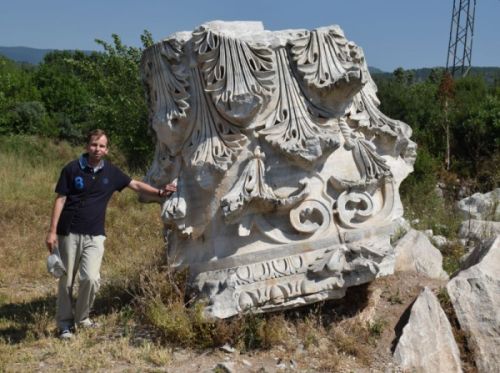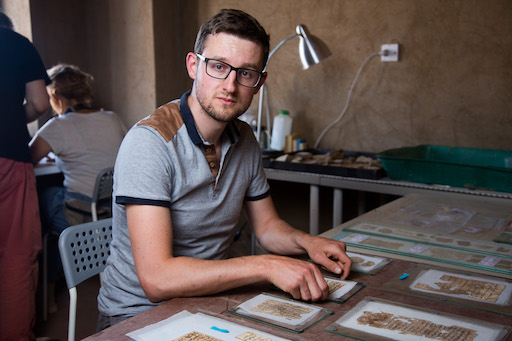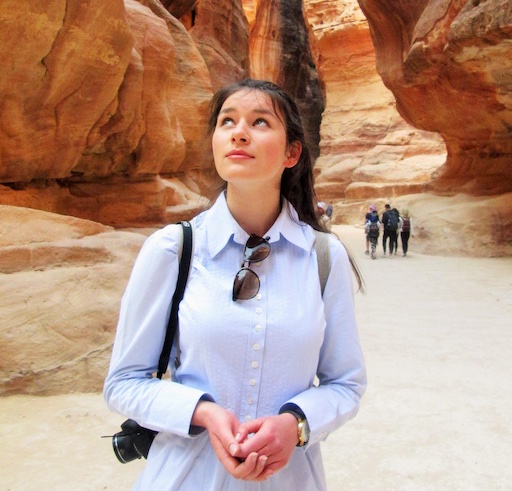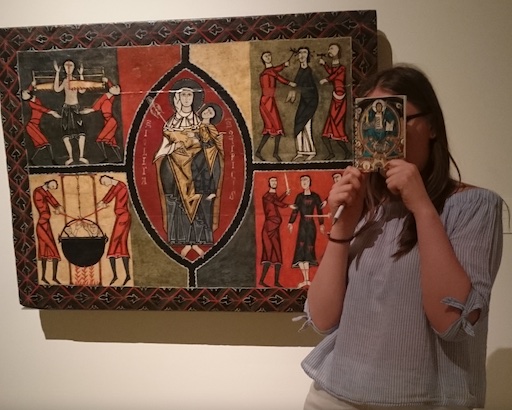About our Team
Principal Investigator

Paweł Nowakowski
adiunctus (asst. prof.) at the Faculty of History, University of Warsaw
(pawel.nowakowski@uw.edu.pl)
Paweł is a historian and epigraphist of the late antique period. His research interests focus broadly on the use of inscriptions: as an instrument of the cult of saints, as markers of one’s identity, and others. He is also involved in graffiti studies and publishing new finds of Greek inscriptions from Asia Minor and the Middle East (among others on behalf of the Princeton Euchaita-Avkat project in Pontus, and of the Marmora Asiatica project exploring the quarries of western Asia Minor).
Paweł earned his Ph.D. in 2015 from the University of Warsaw, with a dissertation titled: ‘Facets of the Cult of Saints in Asia Minor. The Epigraphic Patterns prior to the 7th c. AD’. Between 2015 and 2018 he worked as a research associate (postdoc) at the University of Oxford, on the project ‘The Cult of Saints in Late Antiquity’ funded by an ERC-Advanced Grant. Paweł has also enjoyed support from the Foundation for Polish Science (FNP), the Ministry of Science and Higher Education of Poland, the National Science Centre (NCN), and the Krupp-Stiftung for a number of projects and short research stays at European institutions. Since 2018 he has been holding a full-time lectureship in ancient history at the Faculty of History of the University of Warsaw, where he offers classes in the history of ancient Greece and Rome for undergraduate students, and classes in the history of the Late Roman East, hagiography, and recently digital epigraphy for graduate students.
Paweł came up with an idea of this project first in 2017 when he was processing Middle Eastern inscriptions for the Cult of Saints in Late Antiquity database. It struck him how much work is still to be done on Syriac and Aramaic inscriptions from the early Byzantine period, and how important they are for an in-depth understanding of Greek inscriptions from this same region: their phrasing, vocabulary, syntax, and most importantly the people behind them. Then followed a period of collecting the evidence, preliminary research, and drafting the grant application. And finally, our project was successfully launched in the autumn of 2020.
IT Expert

We will recruit one or two IT Experts to oversee the digital side of the project.
Research Associate 1 (doctoral candidate)

Tomasz Barański
research assistant (Polish Centre of Mediterranean Archaeology, University of Warsaw), scholarship holder (Faculty of History, University of Warsaw), doctoral candidate (Antiquity of Southeastern Europe Research Centre, University of Warsaw)
(tomaszbaranski@uw.edu.pl)
Tomek, a person of many talents and affiliations, is an indispensable member of the project. He is a skilled Arabist and had training in other Semitic languages, including Aramaic. His main fields of research are Arabic papyrology, epigraphy of the late antique Middle East, and archaeological field work. He graduated in both archaeology (2016) and Oriental studies (2020) from the University of Warsaw. He spent several months in Cairo studying bilingual Greek-Arabic papyri and the tax system of early Islamic Egypt as a scholarship holder granted by the Ministry of Science and Higher Education of the Republic of Poland (2016, 2018). During these stays he also improved his skills in Colloquial Egyptian. In the meantime he held an Erasmus scholarship at Leiden University (2018-2019) and was involved in fieldwork on a number of sites: Jiyeh (Lebanon), Marina el-Alamein and ‘Marea’/Hawwariya near Alexandria (Egypt) and Old Dongola (Sudan).
In 2020 Tomek was appointed a scholarship holder on our project and the principal inputter to our database. He will be responsible for processing most of the EpiDoc datasets of inscriptions which we have gathered. He is also working on his dissertation and is preparing to apply for his own project on the Muslim religious and economic elites of the pre-modern Sudanese state in Old Dongola.
Research Associate 2 (postdoc)

Martyna Świerk
postdoc on the EpIdentity project (Faculty of History, University of Warsaw)
Martyna is a historian and epigraphist with the specialization in the epigraphic culture of the provinces of the Roman Empire. Her research interests focus broadly on the phenomenon of epigraphy as a medium for different population groups and the relevance of inscriptions in the public space. In recent years, her research was mainly concerned with sites in North Africa.
She earned her PhD in 2023 from the University of Wrocław, with a dissertation entitled: ‘Society of Roman Carthage. The Epigraphic Study’. The thesis was an attempt to present the society of the city’s epigraphic population over nearly five centuries, with a special focus on cultural influences (Roman, Punic and Libyan) in Carthage. During her doctoral studies, Martyna spent several months in Rome at the Sapienza University, pursuing individual research projects (‘Epigraphic culture of Roman Carthage’ and ‘Sociotopography of Roman Carthage – preliminary studies’). Moreover, she completed several library research stays: at the American Academy in Rome, the University of Oxford and at the Deutches Archaologisches Institut in Berlin. She also had the opportunity to participate in an excavation campaign in Nea Paphos (Cyprus). She is also particularly interested in digital humanities and actively participates in the ENCODE project events.
In the EpIdentity project Martyna is responsible for inputting datasets of inscriptions to the project’s database, using the EpiDoc standard. She will also analyze the presentation of non-Greek inscriptions in the public space during the Hellenistic and Roman period.
Intern 1

Julia Borczyńska
Intern (University of Warsaw, Doctoral School of Humanities)
My name is Julia Borczyńska and I began my work on this project as a second year student of MA programme in history. In 2021, I completed my MA thesis and was accepted as a doctoral candidate at the University of Warsaw.
My interests oscillate broadly around the ancient history and topography of the city of Rome, history of art (especially the thrilling apse mosaics from Rome’s late antique churches!), architecture, and archaeology. On EpIdentity project, I am exploring the iconographical programmes of Near Eastern floor mosaics, and improving my EpiDoc skills.
Intern 2

Karolina Tomczyszyn
Intern (University of Warsaw, Interdisciplinary Individual Studies in the Humanities)
I am a third-year student of History within Interdisciplinary Individual Studies in the Humanities at the University of Warsaw. This mysterious affiliation also enables me to attend classes at the Faculties of Classics, Archaeology and Philosophy, which gives me a lot of fun. My interests include Late Antiquity and the religious history of that period (especially the cult of saints and relics). I am likewise passionate about the popular, non-elite culture of that period. Moreover, I try to connect all of this with an interest in the methodology of history. I am also an alumna of the Polish Children’s Fund and, since 2019, I have been working as a tutor within this organization. I had an opportunity to complete several research internships: at the Department of Special Collections at the University Library in Toruń (2017), at the Library of The Institute of Literary Research of the Polish Academy of Sciences (2018), and at the Jewish Historical Institute (2019).